|
Fahrenheit 911 Just Scratches the Surface and Misses Target
by  - July 21, 2004
- July 21, 2004
Michael Moore's new film, Fahrenheit 911, makes some interesting
points, however it passes up many opportunities at more solid criticism
and misses its target at pointing out some major problems of the Bush
administration.
For many people this movie will serve as an "eye opener". It is
important that this eye opener be followed up with deeper investigation.
Regardless of the validity of some of Moore's claims, accurate or not,
the movie has paved the way to broader public inspection of the Bush
administration.
Having said that, I'd like to disuses a few facts that are related to
Fahrenheit 911, but fail to be presented in the film.
- The influence of the Project for a New American Century
(PNAC) on the Bush administration
- The Bush family involvement in the Savings
and Loan scandal and other questionable business dealings
- More relevant examples of the use of fear in
the media and FOX in particular
- The reason why George Bush was on vacation so
much in the first place
The Bush administration and the Project for the
New American Century
I was really quite surprised that Michael Moore left out any mention
of the PNAC whatsoever, because knowing about the PNAC is not only
important for understanding this administration, but the links between
the PNAC and the Bush administration are completely solid and
verifiable.
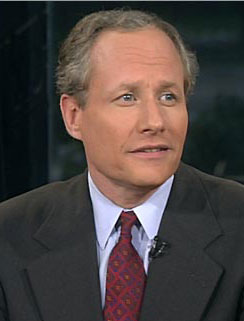
William Kristol
Who is the PNAC? The PNAC is a right-wing think tank, founded by
William Kristol. Who is William Kristol? Well, here is his bio from FOX
News:
William Kristol is a political contributor for the FOX News Channel
(FNC) and serves as a regular contributor to Special Report with
Brit Hume, the highest rated political program on cable
television.
Kristol serves as editor and publisher of the Washington,
D.C.-based political magazine, The Weekly Standard.
Widely recognized as one of the nation's leading political analysts
and commentators, Kristol regularly appears on all the major
television public affairs shows.
Kristol served as chief of staff to Vice President Dan Quayle
during the Bush administration and to Secretary of Education William
Bennett under President Ronald Reagan. Before coming to
Washington in 1985, Kristol taught politics at the University of
Pennsylvania and Harvard University's Kennedy School of Government.
Before starting The Weekly Standard in 1995, Kristol led
the Project for the Republican Future, where he helped shape the
strategy that produced the 1994 Republican congressional victory.
William Kristol - Bio
Kristol founded the PNAC in 1997 and the organization quickly set
about putting together a program for America's future… America's future
president.
The PNAC list of associates reads like a who's who of the powerful
wealthy American Right.
All told, sixteen members of George Bush's cabinet are members or
associates of the PNAC, and these are not just any cabinet members, but
in fact some of the most influential members. The members of the Bush
cabinet who are associated with the PNAC are as follows:
- Dick Cheney: a PNAC founding member - Vice President
- Donald Rumsfeld: a PNAC founding member - Secretary of Defense
- Paul Wolfowitz: a PNAC founding member - Deputy Secretary of
Defense
- I. Lewis Libby: a PNAC founding member - chief of staff for Cheney
- Elliott Abrams: NSC representative for Middle Eastern Affairs,
president of the Ethics and Public Policy Center
- Richard Armitage: Deputy Secretary of State
- John Bolton: Under Secretary for Arms Control and International
Security Affairs
- Seth Cropsey: Director of the International Broadcasting Bureau
(Voice of America)
- Paula Dobriansky: Undersecretary of State for Global Affairs
- Francis Fukuyama: Johns Hopkins University, appointed to the
President's Council on Bioethics
- Bruce Jackson: president of U.S. Committee on NATO
- Zalmay Khalilzad: U.S. Ambassador to Afghanistan
- Peter W. Rodman: Assistant Secretary of Defense for International
Security
- Randy Scheunemann: Iraq advisor to Rumsfeld
- Dov S. Zakheim: Comptroller of the Defense Department
- Robert B. Zoellick: U.S. Trade Representative
Other high profile members of the PNAC:
- Jeb Bush: Governor of Florida
- Steve Forbes: multi-billionare publisher of Forbes Magazine,
former presidential candidate
- Gary Bauer: former presidential candidate, president of American
Values
- Richard Perle: a PNAC founder, formerly of the Defense Policy
Board
- Dan Quayle: former vice-president
- William J. Bennett: former Secretary of Education and Drug Czar,
co-founder of Empower America, author of the Book of Virtues
- Ellen Bork: deputy director of PNAC
- Rudy Boschwitz
- Eliot A. Cohen: professor of strategic studies at Johns Hopkins
University
- Thomas Donnelly: director of communications, Lockheed Martin
- Aaron Friedberg: director of the Center of International Studies
- Frank Gaffney: columnist, founder of Center for Security Policy
- Reuel Marc Gerecht: director of the Middle East Initiative
- Fred Ikle: Center for Strategic and International Studies
- Donald Kagan: Yale University professor, conservative columnist
with various State Department ties
- Jeane Kirkpatrick: former U.S. ambassador
- Charles Krauthammer
- Christopher Maletz
- Daniel McKivergan
- Norman Podhoretz: Hudson Institute
- Stephen Rosen: Beton Michael Kaneb Professor of National Security
and Military Affairs, Harvard University
- Henry Rowen: former president of Rand Corporation
- Gary Schmitt
- Vin Weber: former congressman, lobbyist, vice-chairman of Empower
America
- George Weigel: political commentator
- R. James Woolsey: vice-president at Booz Allen & Hamilton
Okay, so these people are obviously associated with the PNAC, so
what?
The Bush administration clearly came into office with the intention
of implementing strategies developed by the PNAC - well... the Bush
cabinet essentially is the PNAC. These are people who were all working
together as a team for at least three years prior to their entrance into
the White House.
What exactly were the plans of the PNAC that they developed prior to
Bush's entry into office? The segments below are direct extracts from
the PNAC report, Rebuilding America's Defenses:
Strategy, Forces and Resources For a New Century.
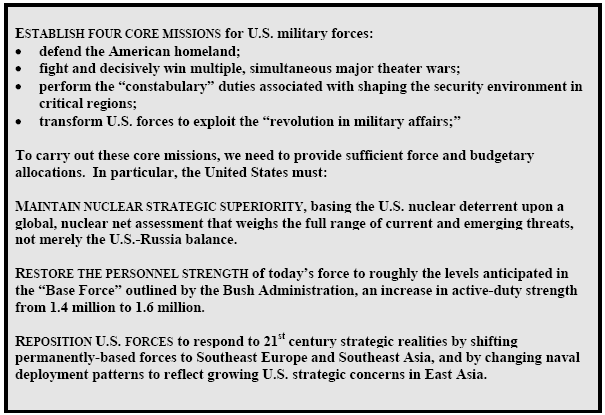
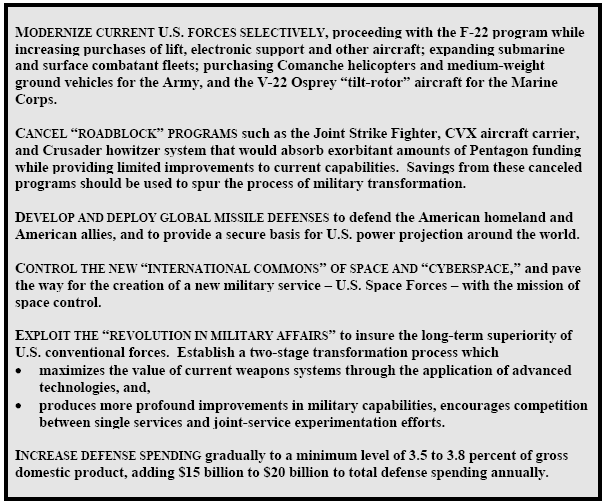
The writing of the report began in 1998, and states:
In the Persian Gulf region, the presence of American forces, along
with British and French units, has become a semipermanent fact of
life. Though the immediate mission of those forces is to enforce the
no-fly zones over northern and southern Iraq, they represent the
long-term commitment of the United States and its major allies to a
region of vital importance. Indeed the United States has for decades
sought to play a more permanent role in Gulf regional security.
While the unresolved conflict with Iraq provides the immediate
justification, the need for a substantial American force presence in
the Gulf transcends the issue of the regime of Saddam Hussein.
...
From an American perspective, the value of such bases would endure
even should Saddam pass from the scene. Over the long term, Iran may
well prove as large a threat to U.S. interests in the Gulf as Iraq
has. And even should U.S.-Iranian relations improve, retaining
forward-based forces in the region would still be an essential
element in U.S. security strategy given the longstanding American
interests in the region.
Clearly, this indicates a strong strategy on the part of the PNAC to
take military action against Iraq, which was developed at least between
the years 1998 and 2000, if not before. Remember who the PNAC is:
Cheney, Rumsfeld, Wolfowitz (the benign looking guy that was spitting on
his comb in the beginning of the movie), Jeb Bush, etc., and don't
forget the FOX connections, we will come back to that as well.
So, is President Bush just following the PNAC game plan? Let's see.
Unfortunately I am not qualified or informed enough to comment on all of
the items outlined in the PNAC plan above, but I will tackle what I can.
Develop and Deploy Global Missile Defenses
One of the first actions of the Bush administration once in office
was to pull out of the Anti-Ballistic Missile treaty with Russia and
announce plans for a Global Missile Defense program.
During the 2000 campaign Bush commented that he favored missile
defense program. To this, William Cohen, a Republican, of the Joint
Chiefs of Staff offered to brief then governor Bush on the realities of
missile defense systems. To this Bush responded:
"I have one of the finest foreign policy teams ever assembled,
I call upon my opponent not to allow members of the administration
to politicize matters of defense."
Indeed, George Bush did in fact have a foreign policy team assembled,
which had already developed a full plan and set of goals for its foreign
policy initiatives, and developing a missile defense program was part of
that plan.
On December 14, 2001 George Bush announced that he was pulling the US
out of the ABM treaty with Russia, so that America could peruse the
development and testing of a a global missile defense system saying:
"Today I am giving formal notice to Russia that the United
States of America is withdrawing from this almost 30-year-old
treaty, I have concluded the ABM treaty hinders our government's
ability to develop ways to protect our people from future terrorist
or rogue state missile attacks."
CNN.com - U.S. quits ABM treaty - December 14, 2001
Bush accuses Gore camp of 'politicizing' missile
defense - May 30, 2000
Control the New International Commons of Space and
Cyberspace
Provisions in the Patriot Act are part of an effort to control
cyberspace, and the Total Information Awareness program put forward by
the administration was another effort to peruse this goal. It doesn't
stop with cyberspace though.
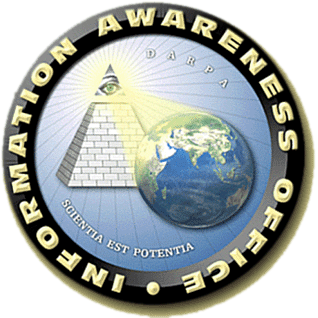
Remember Bush's seemingly off-the-wall plan to go to the moon? That
was no off-the-wall plan, that is a part of the PNAC plan for the
development of military dominance of outer space as stated above.
In January of 2004 President Bush announced an initiative to put men
on the Moon again and to peruse a manned mission to Mars. Bush announced
these plans by stating:
America is proud of our space program.
The risk-takers and visionaries of this agency have expanded human
knowledge, revolutionized our understanding of the universe and
produced technological advances that have benefited all of humanity.
Inspired by all that has come before, and guided by clear objectives,
today we set a new course for America's space program..
However, what President Bush failed to mention in his speech is that
the administration had already begun its
military space program and that it was impossible to get the
kind of funding desired for the purely military space program and that
thus this "exploratory program" was proposed as a means to get the
funding needed to develop the types of space technologies needed for
further military development.
Not everyone was fooled though, as Dr. Laura Grego of the
Union of Concerned Scientists
demonstrates:
"One prominent goal of the new Bush initiative is to land the
first human being on Mars. But the administration is also planning a
first that has not been announced with a press conference: the first
stationing of weapons in space.
"Unlike the newly conceived civilian space plan, the Bush
administration began to press ahead with its military space plan at
the very beginning of its term. And key parts are on the fast track:
the first prototype weapon is scheduled to be in orbit by 2007 or
2008-before the end of a second Bush term. These plans are opposed
by essentially the entire international community, which rightly
believes that going down this path will bring the world less
security-not more.
"An expanded space program to return to the Moon and go to Mars will
almost certainly include substantial funding to develop new launch
vehicles and technologies, as well as new and improved propulsion
technologies, and technologies for generating large amounts of power
in space. All of these technologies would also be useful to the
Pentagon for its military space plans.
"To what extent the administration's new space initiative reflects a
real interest in space exploration or is motivated by a desire to
develop technologies that could benefit its core interest-military
space activities-or to put a peaceful gloss on its military
ambitions is an open question."
Many people were surprised by Bush's announcement of a space plan,
especially one as costly as he proposed at a time when it seemed that so
many other "more important things" were going on in the world, but this
is because people listened to what the President said and didn't read
between the lines. What he said in his speech was that he wanted to
embark on a bold new voyage of exploration for the good of humanity,
while at the same time he was making an irrational case for a war
against Iraq. This left many confused, but only because they didn't
realize the military intentions behind the facade.
It is all quite clear in the PNAC vision for the future however:
...this report will argue below that the emergence of space as a
key theater of war suggests forcefully that, in time, it may be wise
to create a separate "space service."
Even as the means for delivering firepower on the battlefield shift
- strike aircraft have realized all but the wildest dreams of air
power enthusiasts, unmanned aerial vehicles promise to extend strike
power in the near future, and the ability to conduct strikes from
space appears on the not-too-distant horizon - the need for ground
maneuvers to achieve decisive political results endures. Regimes are
difficult to change based upon punishment alone.
To ensure America's control of space in the near term, the minimum
requirements are to develop a robust capability to transport systems
to space, carry on operations once there, and service and recover
space systems as needed. As outlined by Space Command, carrying out
this program would include a mix of reuseable and expendable launch
vehicles and vehicles that can operate within space, including
"space tugs to deploy, reconstitute, replenish, refurbish, augment,
and sustain" space systems. But, over the longer term, maintaining
control of space will inevitably require the application of force
both in space and from space, including but not limited to
antimissile defenses and defensive systems capable of protecting
U.S. and allied satellites;
And so you see, while the President was pumping people with talk of
grand space exploration for the "benefit of humanity", his proposal was
really a means of acquiring funding to develop
"a robust capability to transport systems to space, carry on
operations once there, and service and recover space systems as
needed," as outlined in the PNAC program for American military
conquest of outer space.
In fact "space" is mentioned 132 times in the 76 page PNAC report,
making it a significant topic of the paper.
Increase "Defense" Spending
Of course it goes without saying that the Bush administration has
increased military spending, and in fact the Bush administration
proposed increased military spending even prior to 9/11.
Just prior to his entry into the White House Bush, accompanied by
Dick Cheney, attended a meeting of lawmakers to discuss the issue of
military spending. CNN reported that:
Bush has proposed spending $20 billion more for weapons research
and development and $1 billion more per year for a military pay
raise. He also favors developing a missile defense system.
Notice that CNN reports that "Bush proposed spending $20 billion more..."
From the PNAC report:
INCREASE DEFENSE SPENDING gradually to a minimum level of 3.5 to
3.8 percent of gross domestic product, adding $15 billion to $20 billion to total defense spending
annually.
Just prior to September 11th the Bush administration was working hard
to defend its budget increases for the military when it was apparent
that the budget surplus from the Clinton administration was rapidly
diminishing. In defending the defense budget Donald Rumsfeld stated:
"We need every nickel, and we'll be working to get it."
CNN.com - Smaller surplus may imperil defense spending
hike - August 23, 2001
Bush discusses defense budget, strategy - January 9,
2001
With even more research I'm sure that more parallels between Bush
administration policy and PNAC plans could be drawn, however it should
be clear even at this point that yes, the Bush administration is
effectively an organization of the PNAC. A large number of Bush
administration officials are PNAC members, including many of the most
important and influential members. Members of the Bush administration,
including Paul Wolfowitz and Lewis Libby, are sited as direct
contributors in Rebuilding America's Defenses,
and many elements of "Bush's" policies are practically quoted from its
text, including the engagement of Saddam Hussein in Iraq.
For more information on the Bush administration and the PNAC see:
The Lies- The Bush team
lied about intentions for war from the start
The Bush family and the Savings and Loan Scandal
I was also quite surprised that with all of the personal attacks on
the Bush family, Moore passed up perhaps one of the most well known and
verifiable scandals that the family has been involved in, which is the
Savings and Loan scandal of the late 1980s.
Not only was George Bush Sr. involved in the scandal but so were
George Bush Jr.'s brothers, Neil and Jeb Bush, making it an entire
family affair. While this may not have had anything directly to do with
Iraq its mentions is surely worthy of note.
In fact, the Desert Storm campaign was launched just as the Neil
Bush's involvement in the Savings and Loan Scandal was beginning to make
headlines.
The policies of the Reagan/Bush administration helped to contribute
to the Savings and Loan crisis. George Bush Sr. then withheld
information about the crisis from the press until after he had entered
office in 1989. This greatly increased the problem by delaying the
handling of the crisis for three or four years after it became a serious
issue.
Neil Bush was charged with criminal wrongdoing in the affair for his
actions as director of Silverado Savings and Loan and ended up paying a
small fee of $50,000 to settle out of court.
Jeb Bush himself defaulted on a $4.56 million loan from Broward
Federal Savings, which the taxpayers have had to pay back.
All in all the Savings and Loan Scandal cost America $1.4 trillion,
making it one of the single largest components of our national debt.
I have covered this issue in greater detail on this website here:
The Bush family and the S&L (Savings and Loan) Scandal
The media, fear and FOX
Moore did spend some time in Fahrenheit 911 presenting several ways
in which a climate of fear was cultivated in America through American
news agencies, however he failed to present some of the news stories
that had the biggest impact, many of which were directly presented by
the Bush administration.
In October of 2003 retired National War College instructor, Sam
Gardner, published a paper detailing over 50 stories that he, as a
military psychological operations (psyops) analyst, had determined were
part of a coordinated effort to "sell" the war in Iraq by the Bush and
Blair administrations. In Truth From These Podia he
noted:
One element of the darker side was psychological operations.
Strategic influence is aimed at international audiences (and maybe
domestic audience). PSYOPS, on the other hand, are targeted at the
bad guys. The problem is that during this war PSYOPS became a major
part of the relationship between the governments of the US and the
UK and the free press.
Orange Alert and Duct Tape
One of the major news stories in the lead up to the war with Iraq
involved the use of the "Homeland Security Advisory System" and a story
about the threat of a "massive chemical weapons attack" on America,
resulting in setting the Homeland Security Advisory System to "orange
alert".
On February 7, 2003 John Ashcroft and Homeland Security Director Tom
Ridge announced that the Homeland Security Department was raising the
"alert status" to code orange because of evidence of an impending
Al-Queda attack on America with Weapons of Mass Destruction.
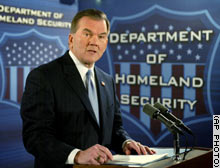
CNN.com - Ashcroft, Ridge, Mueller announce threat
level increase - Feb. 7, 2003
During the announcement Ridge stated:
Today we call on Americans to continue to persevere in the face
of this evil, in the face of this terror. Because we understand that
by working together not only will we persevere, but we will prevail.
Once this major announcement had been made all the major news
stations ran many stories related to the situation, such as:
FOXNews.com - U.S. &
World - Food? Check. Duct Tape? Check. Plastic? Check.
Federal officials have recommended that Americans take basic
disaster-preparation steps such as maintaining a three-day stockpile
of food and water. They also recommend obtaining duct tape and
plastic sheeting to seal a house in a chemical or biological
attack...
The couple said they have also agreed to rendezvous with about
30 family members at their vacation house near Grand Lake northeast
of Tulsa if there is an attack. Their families have also secured
satellite phones in case communications are disrupted by terrorists.
"These people are crazy," said Melissa Jackson, 29. "You don't know
what they're going to do. We don't think anything's going to happen,
but it's better to be safe than sorry."
Paul Jackson, 34, said he had spent less than $100 on supplies, "so
it's worth the risk if nothing happens."
Jim Ash, 50, of Overland Park, Kan., stopped by a Home Depot to buy a
generator cord that he said he would have needed even if the terror
alert level had not been raised.
CNN.com
- Duct tape sales rise amid terror fears - Feb. 11, 2003
On Tuesday, less than 24 hours after U.S. Fire Administrator
David Paulison described a list of useful items, stores in the
greater Washington, D.C. area reported a surge in sales of plastic
sheeting, duct tape, and other emergency items.
These items, Paulison said, can be helpful after a biological,
chemical or radiological attack.
A Lowe's hardware store in Alexandria, Virginia, said every roll of
duct tape has been sold. Another Alexandria Home Depot store
reported sales of duct tape tripled overnight.
"Everything that was on that newscast, we are selling a lot of it,"
said Rich Pierce with a Home Depot in the D.C. area.
Shortly after the "Orange Alert" was issued, it was revealed that the
basis for the alarm was unjustified.
ABCNEWS.com - Alert Partly Based on Lies
A key piece of the information leading to recent terror alerts
was fabricated, according to two senior law enforcement officials in
Washington and New York.
The officials said that a claim made by a captured al Qaeda
member that Washington, New York or Florida would be hit by a "dirty
bomb" sometime this week had proven to be a product of his
imagination.
The media of course hyped the initial claim and ran a large number of
stories that contributed to heightened anxiety, but when facts emerged
that the claims had been made prematurely on unsupported information,
that was only a minor story.
Fall of the Saddam Statue - Military psyops
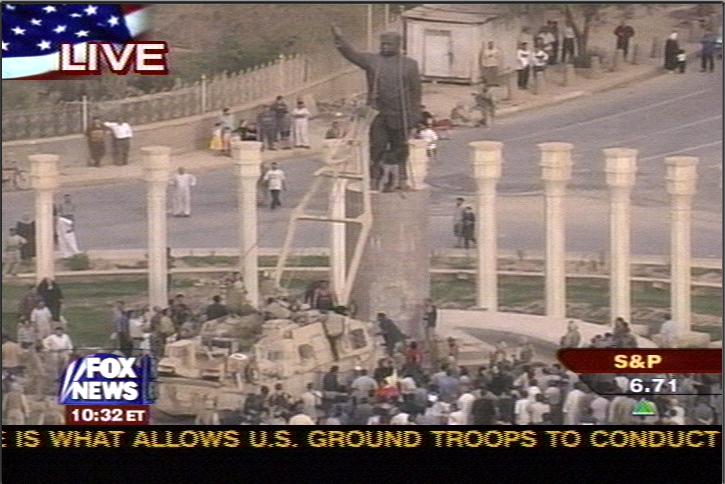
The images of the tearing down of the Saddam statue on April 9th are
undoubtedly some of the most unforgettable images of the war. Footage of
Iraqi citizens and children pounding on the statue and helping to bring
it down were emotional and greatly supported the war effort. The images
were broadcast live on nearly every American news network, as well as
networks around the world, and were replayed many times since.
On April 9th the FOX News channel reported on the event saying:
With it, TV had the perfect stand-in for an elusive tyrant
meeting his end. The scene instantly took its place in television's
archive of unforgettable news imagery...
"Pictures like this don't just show facts. Television turns
information into drama," said Lichter, president of the Center for
Media and Public Affairs...
Cameras had focused on the scene early on, as the drama began.
First, Iraqi citizens clustered around Saddam's
towering likeness, then began their efforts to bring it down,
starting with a sledgehammer against its concrete pedestal.
While the world looked on, Fox News Channel's Brit Hume likened the
statue's raised right hand to "a kind of goodbye wave. There's a
sort of see-ya-later-buddy feel to this whole thing."
But despite the air of inevitability, for a while the 40-foot-tall
statue stood firm against its attackers.
Finally, with the aid of U.S. Marines and
their armored personnel carrier tugging on the statue by its throat,
the Iraqis met with success. At 10:49 a.m. EDT, the huge statue made
a slow swoon, then hung, caught horizontally, for a few moments.
Then the statue tumbled to the ground, where it suffered decapitation
before citizens joyously dragged its head through the streets.
"It was awesome. Finally, those poor people are free," said Frances
Loussararian, who watched the statue's demise on ABC's "Good Morning
America." She's an office worker in Tustin, Calif.
On Long Island's East End, 8-year-old Thomas Batuello saw it all in
school with the rest of his second-grade class. The Cutchogue, N.Y.,
youngster was amazed.
"After they pulled it down, the men were jumping up and down and
laughing," he reported. "When I have kids, it will be a big story
for me to tell them about."...
At a briefing Wednesday, Secretary of Defense Donald Rumsfeld hailed
the day's TV images from Baghdad, which he called "breathtaking.
Watching them, one cannot help but think of the fall of the Berlin
Wall and the collapse of the Iron Curtain."
FOXNews.com -
Foxlife - Toppling Saddam Statue Lets Viewers Watch TV History
Despite the popularity of the images and the seemingly genuine nature
of the event, criticism of the toppling of the statue quickly surfaced
among alternative new sources.
The allegation? The toppling of the statue was in fact not a
spontaneous event that was initiated by Iraqis, as it was portrayed on
networks around the world, but in fact it was a propaganda event staged
by the military.
By April 10th the image below was circulating around the internet:
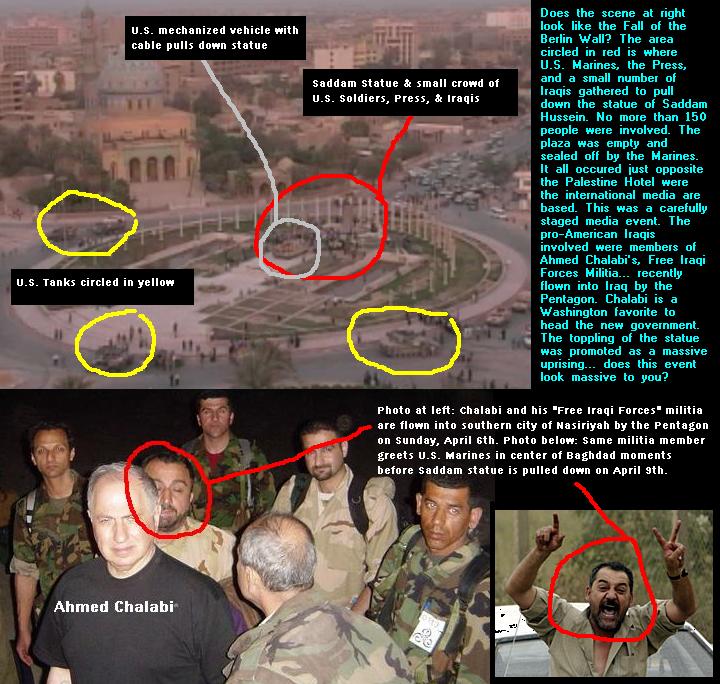
Of course it has recently been reported that Ahmed Chalabi gave
American State secrets to Iran, including information that the US had
cracked Iranian communications codes, though this was not known at the
time of the fall of the Saddam statue.
At any rate, by April 10th evidence was already being put together
claiming to show that the toppling of the Saddam statue was an event
that didn't happen the way it was reported to have happened by news
agencies.
In addition, an eye witness account of the event by an Australian was
shown on Australian television. The account can be seen here:
The Toppling Of Saddam Statue- An Eyewitness Report.
The eye witness stated on Australian television on April 17th, 2003:
Well, there certainly was some jubilation, but I certainly
wouldn't go along with that presented by television. The one that
I've seen a lot of since I've been back is the toppling of the
statue of Saddam and I can hardly believe it was the same one that I
saw, because it happened at only about 300m from where I was and it
was a very small crowd. The rest of the square was almost empty, and
when we inquired as to where the crowd came from, it was from Saddam
City. In other words, it was a rent-a-crowd. Now, that piece of
television has been played over and over again, but I've seen
nothing of the pieces of television, for example, what happened in
Mosul the other day, where the Americans opened fire on a crowd
killing 10 and injuring 100 when it became anti-American. So I think
the scenes of jubilation have to be balanced against the other side
of the picture.
Recently, on July 3, 2004, the LA Times reported that the American
military has acknowledged that the Saddam statue event was a display
that was orchestrated by an Army psychological operations unit.
As the Iraqi regime was collapsing on April 9, 2003, Marines
converged on Firdos Square in central Baghdad, site of an enormous
statue of Saddam Hussein. It was a Marine colonel - not joyous Iraqi
civilians, as was widely assumed from the TV images - who decided to
topple the statue, the Army report said. And it was a quick-thinking
Army psychological operations team that made it appear to be a
spontaneous Iraqi undertaking.
After the colonel - who was not named in the report - selected the
statue as a "target of opportunity," the psychological team used
loudspeakers to encourage Iraqi civilians to assist, according to an
account by a unit member...
Ultimately, a Marine recovery vehicle toppled the statue with a
chain, but the effort appeared to be Iraqi-inspired because the
psychological team had managed to pack the vehicle with cheering
Iraqi children.
Army Stage-Managed Fall of Hussein Statue
It was apparent when watching the footage that the photography was
carefully crafted because the shots were primarily close-ups and taken
from angles that masked the small size of the crowd.
Just what is going on at FOX news?
Michael Moore pointed out the fact in Fahrenheit 911 that George
Bush's cousin, John Ellis Bush, was the man at FOX who first called the
Florida election for Bush. John Ellis Bush, which is also the name of
Bush's brother and governor of Florida, who goes by his initials "Jeb",
was hired by FOX to manage the decision desk for election coverage at
FOX. Ellis isn't just a cousin of Bush though, during the election Ellis
wrote editorials defending his cousin. He later stopped writing
editorials covering the candidates because of his self admitted bias. He
stated publicly:
I am loyal to my cousin, Governor George Bush of Texas. I put
that loyalty ahead of my loyalty to anyone else outside my immediate
family.
Additionally, what Moore didn't point out is that the Chairman of FOX
news is Roger Ailes, the former Bush Sr. campaign strategist. Roger
Ailes is important to understand for a variety of reasons. Ailes helped
to "revolutionize" political campaigning during his involvement in Bush
Sr.'s 1988 campaign. This campaign was the first to use a now common
tactic of using multiple independent organizations to blanket the media
with campaign ads and news coverage of a politically biased nature. The
Willie Horton ad campaign is now a textbook case for political campaign
strategists to study and emulate.
The Horton campaign involved the use of "independent" political ads
that were run by private organizations, and thus not directly part of
the official political campaign. This did several things; it got around
campaign finance laws, but more importantly, it separated the message
from the candidate. This was important because the message in this case
was racist and an attack on his opponent Michael Dukakis.
The independent ads made their case against Dukakis using "hardcore"
tactics, and then the official Bush campaign several weeks later made
references that were associated with these ads, while not directly
mentioning Willie Horton. The association was clear in the minds of
viewers though, but even more importantly, these "independent" groups
helped to get the Willie Horton story onto prime time news and also
sponsored a national tour by victims of Horton's crimes. To the public,
none of this appeared to have been promoted by Bush or the Bush
campaign, it just looked like "regular news", however it was news
stories that were being funded by a political group that was working to
get George Bush Sr. elected president.
For more on this see:
Independent Ads: The National Security Political Action
Committee "Willie Horton"
Now, in all of this, Roger Ailes made sure that the official Bush ads
were constructed in such a way as to take advantage of the hype
generated by the other campaigns and news stories, while also appearing
to be removed from them. This was done by not specifically mentioning
Willie Horton in the official Bush ads, but instead discussing crime in
more general terms.
So, what we see is that Roger Ailes is a man very much aware of how
to manipulate the media, and who has also demonstrated on more than one
occasion a willingness, if not eagerness, to do so. At the same time
Ailes is a long time friend of the Bush family and has worked in support
of the Republican party since the Nixon administration.
Ailes, who later worked on the Rush Limbaugh television program,
helped to pioneer political campaigns that make use of official news
sources to "get their message out". Now this man is the head of FOX
news, an obviously very biased news channel, that touts itself as "Fair
and Balanced".
With Ailes as Chairman, William Kristol (founder of the PNAC.) has
been a regular contributor, George Bush's cousin was hired by FOX to
call the election results on the night of the election, and to no
surprise, once the war in Iraq was underway, FOX was the most supportive
"news" channel of the war.
In a national study conducted in 2003 it was determined that viewers
of the FOX news channel were the most supportive of the war in Iraq and
that they also held the most misperceptions about the war in Iraq.
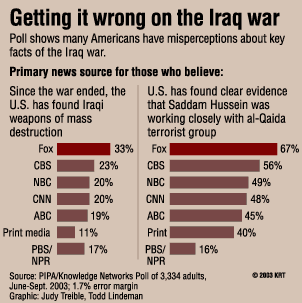
The study found that:
Standing out in the analysis are Fox and NPR/PBS--but for opposite
reasons. Fox was the news source whose viewers had the most
misperceptions. NPR/PBS are notable because their viewers and
listeners consistently held fewer misperceptions than respondents
who obtained their information from other news sources.
The study went on to show that there was a specific link between FOX
news and misperceptions that went beyond demographic variation:
It is also true that Republicans and those with lower education are
more likely to have misperceptions. However, controlling for these
demographic differences by examining the variations in misperception
within demographic groups reveals persisting variations in the level
of misperceptions according to news source, consistent with the
analysis above.
Looking just at Republicans, the average rate for the three key
misperceptions was 43%. For Republican Fox viewers, however the
average rate was 54% while for Republicans who get their news from
PBS-NPR the average rate is 32%.
This demonstrates that the actual news source is likely to be a
reason for the misperceptions.
The full study can be found here:
Misperceptions, the Media and the Iraq War
The question now becomes, is FOX news actually an arm of the
Republican Party?
Clearly what FOX news does is to extend the ideology of the Bush Sr.
election tactics to the next logical level. If private organizations can
be used to help campaign for a candidate or party, and those
organizations can use funds to help get issues onto talk shows and
covered by news agencies, then why not take the next step and actually
create a "news" organization whose role is to continuously "campaign"
for a party. This appears to be exactly what has happened with FOX news;
FOX news is effectively a full time political campaign tool of the
Republican Party, or perhaps the Republican Party is a full time tool of
the heads of FOX news, that may be a hard distinction to make, but in
either event, this is essentially what is going on.
Furthermore, on September 11, 2001, shortly after the attacks on
World Trade Center, Roger Ailes wrote to George Bush's chief political
advisor Karl Rove:
The American public would tolerate waiting and would be patient,
but only as long as they were convinced that Bush was using the
harshest measures possible. Support would dissipate if the public
did not see Bush acting harshly.
- From Roger Ailes' letter to Karl Rove after September 11, 2001
This is a case of a so-called journalist giving directional advice to
a president. That certainly isn't a "journalistic" capacity.
Roger Ailes, William Kristol, and other extremely wealthy men with
political and corporate ties, have bought themselves permanent
mouthpieces. They work behind the scenes, shaping and advocating policy,
and then they publicly act like "unbiased journalists" providing the
public with "fair and balanced" news, however that "news" is really just
promotion of their own political agendas.
Bush was on vacation so his "administration" could
get some work done
What is perhaps the most misguided aspect of Moore's film is that he
focuses his attack on President Bush and acts as though Bush himself is
actually in charge and making decisions. This is evidenced in his
commentary on Bush's reaction to the news of the terrorist attack on
9/11 when he was reading to the students.
The fact that George Bush didn't respond quickly is really of little
importance because George Bush was not in charge. George Bush is not a
leader. George Bush isn't the man making any decisions. George Bush is
the front man for the PNAC. He is the man with the recognized name in
politics and the "common man appeal" that was used to get votes in order
to get Dick Cheney and the rest of the PNAC team into the White House.
Moore made the claim that President Bush was slacking because he was
on vacation more than any other president in American history during his
first 100 days in office. While it is true that President Bush was out
of the office more than other presidents and he did spend a significant
about of time playing golf and relaxing around the ranch, the truth is
that plenty was being done. It was being done by the "real" policy
makers of the administration, Dick Cheney and the rest of the PNAC crew.
Moore incorrectly acts as though Bush is actually a leader and that his
leave of absence from office actually mattered. It didn't matter because
Bush doesn't drive policy in the first place. I think that it's safe to
assume that President Bush was probably encouraged to take leave from
Washington so that the real Washington insiders, the "neo-cons" as they
are called, the PNAC team, could get in and get some work done without
him being in the way.
Bush is clearly a puppet president, and always has been. His
so-called proposals are not of his creation, they aren't his ideas, he
isn't providing leadership. So many of the policies and initiatives that
have been publicly proposed and promoted by George Bush are issues that
have been defined by members of the Bush administration for years, and
this is not just in regard to Iraq, its in regard to all policy,
taxation, the environment, corporate law, healthcare, etc. The few
proposals that are actually likely to have been "Bush's", such as "No
Child Left Behind", have been woefully under funded and largely
forgotten.
In the end, Fahrenheit 911 does a good job of engaging the audience
and hopefully encouraging people to be more critical of the Bush
administration. However, the movie also has the negative effect of
misdirecting some criticism and focusing too much on non issues, while
leaving much more serious and solidly verifiable issues unexposed, as
well as using questionable material and misleading statements. Hopefully
the interest raised by his movie will overcome the shortcomings of his
own presentation.
|